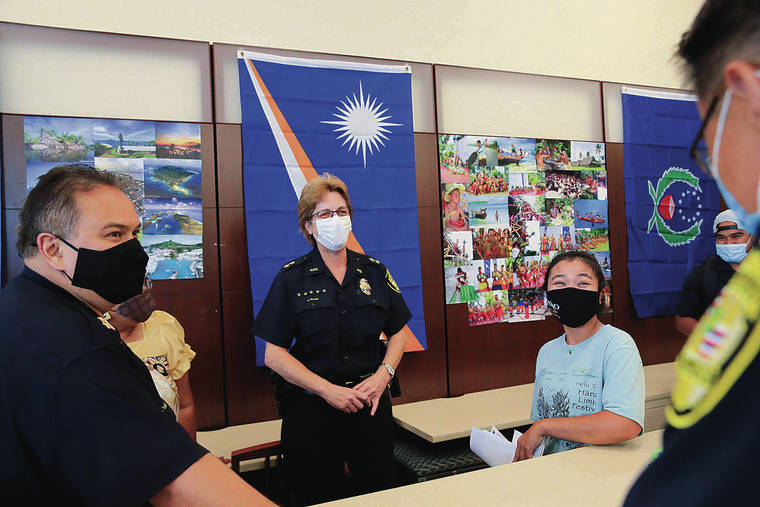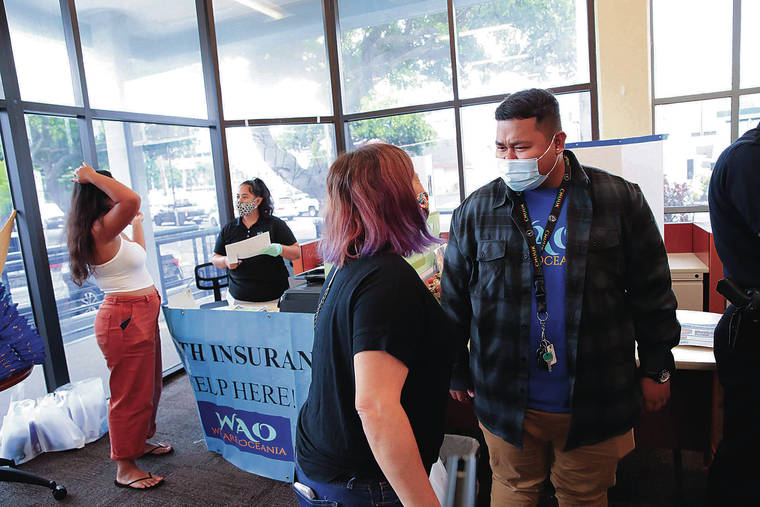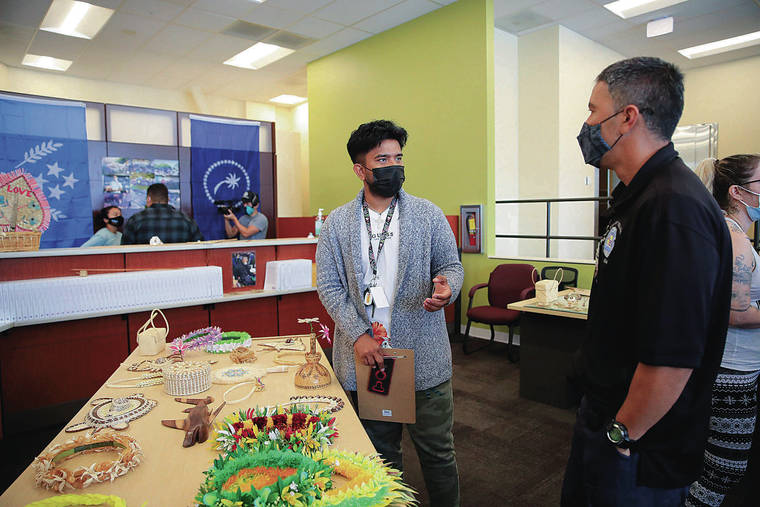We Are Oceania unveiled its new Youth Empowerment Center Wednesday, the first of its kind to serve Micronesian kids and young adults in Hawaii.
Advocates say it’s been a long time coming to have a dedicated, full-fledged center for Micronesian youths that will offer college and career help, cultural exhibitions and programs, study areas, a place to hold meetings, mentorship opportunities, and resources for homeless families.
They say it will also serve as a gathering place for the larger Micronesian community.
About 75 community members and officials, including representatives from the Susannah Wesley Community Center, Residential Youth Serv-
ices and Empowerment, the Honolulu Police Department and the state Department of Education, attended the official opening of the facility on North King Street in Liliha. Visitors toured the space, which also features displays of traditional Micronesian arts and crafts, and provided feedback about what they hope to see at the center moving forward.
J-ward Howard, who is Chuukese and a sophomore studying anthropology at Chaminade University, said he came to the center with his younger sister, Kiumalei, to learn more about the services and programs offered by We Are Oceania, a nonprofit that supports and advocates for the Micronesian and Pacific Islander communities. He said he plans to come back to visit.
“I think this is what our community needs,” said Howard, a Saint Louis School graduate who hopes to write books about Micronesian history and culture after he finishes school. “My goals are trying to make my community known.”
Kiumalei, a soon-to-be freshman at Pearl City High School, added that she’s happy to have a space dedicated to help her and other Micronesian youths.
K-nard Narruhn, We Are Oceania’s youth coordinator and community resource specialist, expressed similar sentiments. As a teenager, Narruhn, who is Chuukese, participated in outreach and community events, such as college fairs, campus visits, mentorship and financial aid help, organized through what would become We Are Oceania. Now, he is happy to be on the other end giving back.
“I’m happy how things turned out. It gives me a lot of reassurance,” Narruhn said. “I think (the opening) went really well.”
Formerly an American Savings Bank branch, the space was offered to We Are Oceania rent free by bank officials when they moved out last year. Although the lease ends in March, Josie Howard, the nonprofit’s chief executive officer, said the agency hopes to secure additional funding to keep and grow the youth center.
Moving forward, she said her team will continue recruiting youth mentors and volunteers and reach out to more community groups for referrals. They hope to expand hours and services as they get more resources and staff, and plan to hold a grand opening ceremony in October during their youth summit.
Howard, who is from
Onoun island in Chuuk, added it was especially important to reach out to HPD to attend Wednesday’s opening in order to build relationships and stay connected in light of recent events in which three police officers were charged in the fatal shooting of Micronesian teenager Iremamber Sykap in April.
Interim Police Chief Rade K. Vanic, who attended Wednesday’s event, said HPD would like to see more Micronesians in their ranks and volunteered to hold some of the department’s recruitment events at the youth center.
“Police work isn’t something that’s done in isolation,” he said. “We want to make sure we connect with the community.”
According to federal government estimates, more than 14,700 Compact of Free Association migrants call Hawaii home. COFA refers to an agreement that authorizes migration to the U.S. and offers financial, social and health assistance to those from the Federated States of Micronesia, the Republic of the Marshall Islands and the Republic of Palau.
But many advocates say that when arriving in Hawaii and elsewhere in the U.S., many COFA migrants face hardships and challenges such as homelessness and language barriers.
Simion Singeichy said he knows how that feels. Born and raised in Chuuk, Singeichy moved to Hawaii in 2010 not speaking any English. As a third grader, he said it was difficult adjusting to life here and trying to catch up to his peers.
He found help from the Susannah Wesley Community Center’s youth and mentorship programs. There, Singeichy had a mentor who would often check on him during the weekends, and he said it was invaluable to have a space where he felt safe and not judged.
Now, Singeichy, a Farrington High School graduate, serves as a youth outreach worker at the community center in Kalihi, where he mentors and supports teenagers who were in similar situations as he was. Working with mostly Micronesian youths, he helps with translation and interpreting, and linking kids to food and housing services.
He said he plans to bring the kids he works with to We Are Oceania’s Youth Empowerment Center and is excited to see a much-needed community hub come to life.
“(My mentor and the staff at Susannah Wesley) gave me a sense of feeling safe. That was where I went to relieve my stresses and be myself. That really helped me a lot,” he said. “(We Are Oceania’s youth center) means so much more than a center. This is a beacon of hope for the community. I’m really stoked and happy.”
The Youth Empowerment Center, at 555 N. King St., is open for drop-ins on Wednesdays and Thursdays from noon to 5:30 p.m. To schedule an appointment outside of regular hours, call 594-2305.
———
Jayna Omaye covers ethnic and cultural affairs and is a corps member with Report for America, a national service organization that places journalists in local newsrooms to report on undercovered issues and communities.






